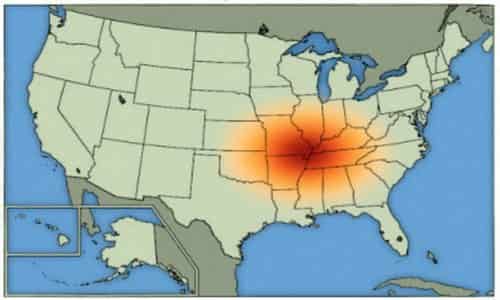Concern Grows That A Megaquake Is Going To Hit The Middle Of The United States
 By Michael Snyder - End of The America Dream Blog September 12, 2016
Share this article:
By Michael Snyder - End of The America Dream Blog September 12, 2016
Share this article:
Did you know that Oklahoma was just hit by the largest earthquake
ever recorded in the history of the state? And did you know that
Oklahoma absolutely shattered their yearly record for earthquakes in
2015 and may break it again this year?
According to the USGS, the number of significant
earthquakes in the eastern and central sections of the nation has more
than quintupled in recent years, and concern is growing that we could
soon see a "megaquake" in the middle part of the country.
Of
course no discussion of megaquakes in the middle part of the country
can leave out the New Madrid fault zone, which is approximately six
times larger than the San Andreas fault zone in California.
Scientists
assure us that the New Madrid fault is around 30 years overdue for a
major seismic event, and when it does happen it is going to be the
biggest disaster in modern American history up to this point.
Late
last month, eight states took part in a major drill that simulated what
the damage from a New Madrid earthquake might look like. The following
comes from a news report that was posted on August 24th...
Eight states are taking part in a multi-state disaster drill Wednesday.
Missouri,
Kansas, Nebraska, Iowa, Illinois, Tennessee, Kentucky and Arkansas all
took part in the "Show Me Mass Care Exercise" to practice how they would
react during a major earthquake along the new Madrid Fault Line, which
is a major source of earthquakes in the Midwest and south.
As
I mentioned above, the New Madrid fault zone is about six times bigger
than the San Andreas fault zone, but because of the nature of the
earth's crust in the region, a New Madrid earthquake would be felt in
most of the nation. In fact, the Missouri Department of Natural
Resources says that earthquakes along the New Madrid fault "shake and
damage an area approximately 20 times larger than earthquakes in
California"...
Due to the harder, colder, drier
and less fractured nature of the rocks in the earth's crust in the
central United States, earthquakes in this region shake and damage an
area approximately 20 times larger than earthquakes in California and
most other active seismic areas.
Even though
large earthquakes occur much less frequently in the NMSZ than in
California, the long term average quake threat, in terms of square miles
affected per century, is about the same because of the approximately 20
times larger area affected in the central United States.
Back in 1811 and 1812, a series of
earthquakes along the New Madrid fault were so powerful that they
actually cracked sidewalks in Washington D.C. and rang church bells in
Boston. Testimony from eyewitnesses to those earthquakes sounds like
something from a post-apocalyptic science fiction novel...
The
Midwest was sparsely populated, and deaths were few. But 8-year-old
Godfrey Lesieur saw the ground "rolling in waves." Michael Braunm
observed the river suddenly rise up "like a great loaf of bread to the
height of many feet." Sections of riverbed below the Mississippi rose so
high that part of the river ran backward. Thousands of fissures ripped
open fields, and geysers burst from the earth, spewing sand, water, mud
and coal high into the air.
In those days not many people lived in the middle of the country.
What in the world would such an earthquake look like today?
I
also want to point out that there are 15 nuclear reactors sitting
inside the New Madrid fault zone, so if a megaquake did hit the region
we could be looking at Fukushima times 15.
And
the earthquakes in Oklahoma (not a part of the New Madrid fault zone)
just continue to keep getting bigger and bigger. The USGS now says that
the earthquake on September 3rd was the largest ever recorded in the
history of the state...
The earthquake that
shook Pawnee, Oklahoma, on Sept. 3 is now the state's largest temblor on
record, according to the U.S. Geological Survey, which just upgraded
the magnitude to 5.8.
The earthquake was
previously pegged at magnitude 5.6. But further analysis of the seismic
recordings from the event found the quake size to have a bigger moment
magnitude, according to the USGS.
As I sit here writing this article, a magnitude 3.0 earthquake struck near Perry, Oklahoma just about an hour ago.
In the old days, you would never think of Oklahoma as a place that was at risk for major earthquakes.
Unfortunately, those days are long gone.

No comments:
Post a Comment